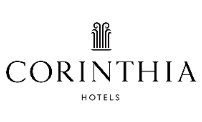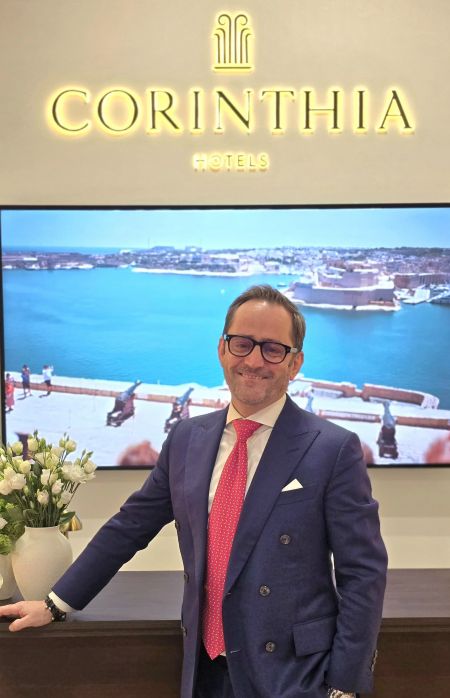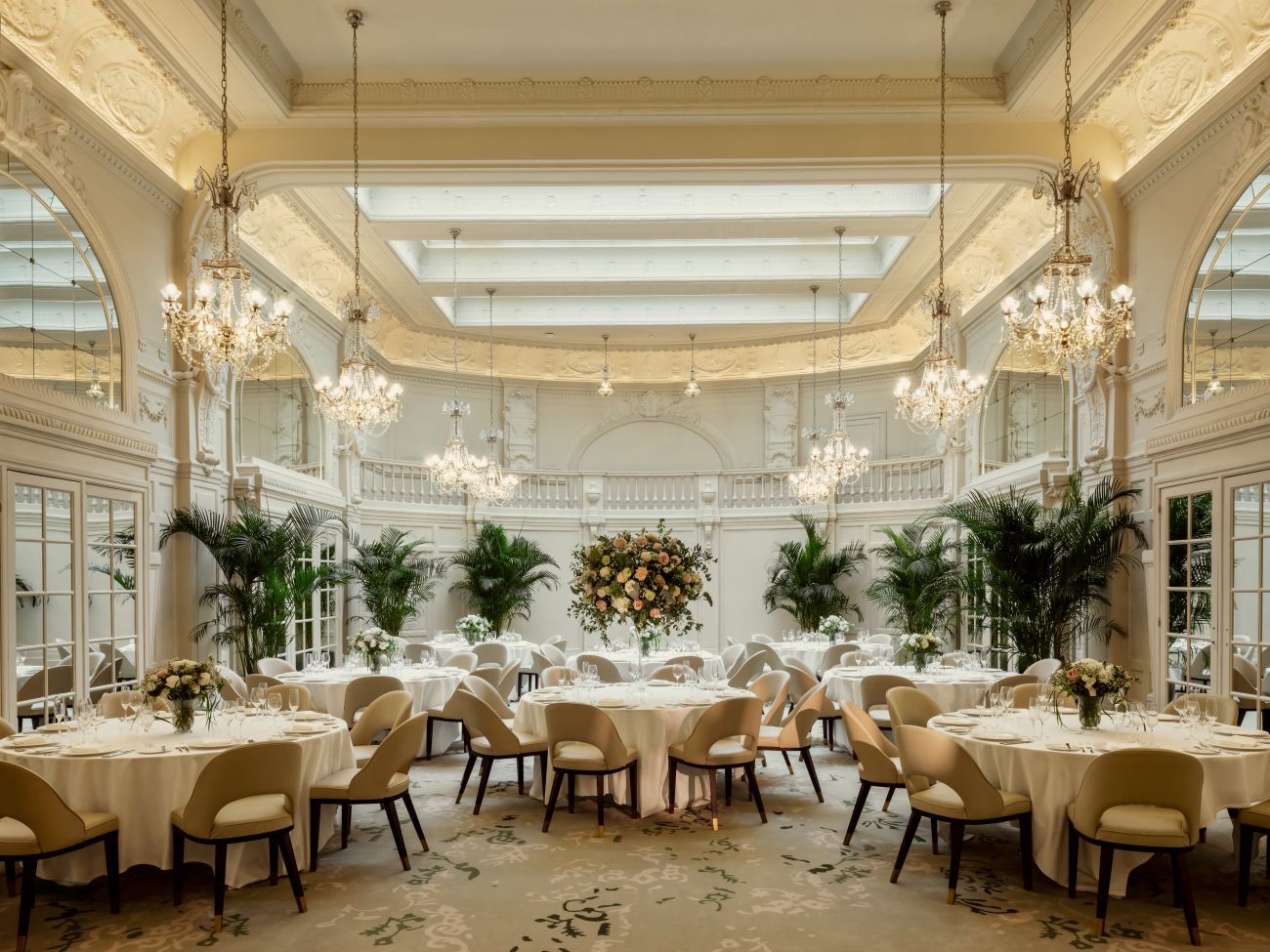 |
EXCLUSIVE - SIMON CASSON, CEO OF CORINTHIA HOTELS: “AS A LEADER, YOUR PRIMARY ROLE IS TO EMPOWER OTHERS”
In an up close and personal conversation, Simon Casson reveals how dedication, hard work, and a commitment to excellence can lead to extraordinary success, even without formal education. |
Category: Worldwide - Interviews and portraits
- Interviews - Industry leaders
Interview made by Sonia Taourghi on Monday 16 December 2024
 Simon Cason, CEO of Corinthia Hotels, during ILTM Cannes 2024
Photo credit © Sonia Taourghi / Journal des Palaces
Starting as a dishwasher in a modest UK restaurant at age 16, Simon's path to becoming one of luxury hospitality's most respected leaders was anything but conventional. This early exposure to hospitality, though far from the luxury sector he would later champion, laid the fundamental groundwork for his understanding of service excellence. His journey took a significant turn in the mid-1980s when he joined a small country house hotel with a Michelin-starred restaurant, providing his first real taste of luxury hospitality. The late 1980s marked another pivotal moment, as he would eventually become the youngest General Manager in Four Seasons' history, beginning a 30-year tenure that would shape his leadership philosophy.
Today, as CEO of Corinthia Hotels, Simon Casson is steering the company through its most ambitious expansion phase in over a decade, with the recent opening of the Surrey in New York City marking the first opening in 12 years, and the inauguration of the Corinthia Brussels (formerly the Grand Hotel Astoria) on the 9th of December, after a 17-year hiatus and four years of renovations! Bucharest, Rome, Gewan Island in Qatar, Riyadh, and the Maldives are set to enrich the portfolio in the next 5 years. His approach combines an unrelenting pursuit of excellence with a profoundly human touch – a philosophy that has become increasingly relevant in the post-pandemic hospitality landscape. This expansion, however, is mostly about reimagining what luxury hospitality can be, focusing on creating environments where commercial success and personal growth can flourish.
What makes Simon's leadership particularly compelling is his ability to balance the meritocratic nature of the industry with a genuine commitment to fostering talent and creating opportunities. Despite having no formal education after age 16, he has strongly advocated for traditional education and alternative paths to success in luxury hospitality. His vision for Corinthia reflects this inclusive approach, emphasising that while luxury remains aspirational, it should be accessible to those willing to work for it. Under his guidance, the company's ambitious goal of reaching 30 hotels in 10 years isn't just about growth; it's about creating enduring foundations that will outlive his tenure and set new standards for luxury hospitality.
Journal des Palaces: What initially drew you to luxury hospitality?
Simon Casson: My entry into hospitality was through something other than luxury's grand entrance but rather through its kitchen door. It began in a modest restaurant in rural UK, where I washed dishes and waited tables. At the time, even this seemed luxurious to me. The energy of the space, particularly the dynamic contrast between the bustling kitchen and the elegant front of house, captured my imagination.
It wasn't until the mid-1980s, working at a small country house hotel with a Michelin-starred restaurant, that I truly encountered luxury hospitality. This era in the UK was marked by iconic English country houses being transformed into hotels – places like Chewton Glen, Lucknam Park, Oakley Court and Eastwell Manor. This experience opened my eyes to the possibilities within the industry. The real turning point came when I joined Four Seasons in the late 1980s, which introduced me to luxury hospitality on an international scale. What set Four Seasons apart was its uncommonly human approach, focusing on the guest experience and the employee journey. This institutional approach to luxury and a deep respect for human values showed me what the industry could be at its finest.
How did you navigate your career progression without formal education?
Leaving school and home at 16 actually gave me an unexpected advantage – I had a five-year head start while others were completing their education. This early start largely explains how I became the youngest General Manager at Four Seasons. However, I had to work exceptionally hard to compensate for my lack of formal education. The journey wasn't easy; it meant taking on responsibilities at a very young age, often feeling overwhelmed by the weight of these roles before I fully matured.
I didn't have the luxury of time to travel or explore like many of my peers. Instead, I maintained a relentless focus on work, pushing forward continuously. While I would encourage young people today to pursue education if possible – at minimum, an undergraduate degree – I'm living proof that its absence doesn't have to impede success. The key is recognising that without formal education, you'll need to chart a different path and likely work harder than your peers. The hospitality industry remains one of the few sectors where merit and performance can truly outweigh educational credentials, though having both is certainly advantageous in today's competitive landscape.
What made you transition from being a successful GM to pursuing executive roles?
The evolution wasn't planned – it emerged organically as I developed in my role as General Manager. Becoming a GM was initially the peak of my aspirations, but over time, I recognised that my skills were evolving in ways that opened doors to greater opportunities. As certain strengths developed, I began to set my sights on regional vice president roles.
The real quantum shift came with becoming president, moving from property-based operations to corporate leadership. This role expanded significantly, eventually encompassing 45 hotels across 26 countries and overseeing 15,000-16,000 employees. However, this was still focused on operations rather than total company management.
Interestingly, when I left Four Seasons, I initially planned to retire to my farm in Croatia. It wasn't until opportunities for CEO positions began presenting themselves that I considered this next step. Even then, possibly due to my background as a high school dropout, I grappled with imposter syndrome. Remarkably, those early insecurities could still surface even in my mid-50s, with significant success behind me.
However, once I stepped into the CEO role, I discovered I could do and excel at it. What drew me was the opportunity to shape an entire company rather than just a part of it, particularly with a smaller organisation looking to elevate and grow, and embark on a new chapter.
What core values drive your leadership approach?
My leadership philosophy for Corinthia is built on a foundation that combines personal values with lessons learned during my four decades of experience. At its heart is creating a purpose-driven company, honouring its historical legacy while embracing future possibilities. Central to this is a deep, foundational belief in people and human culture's critical role in corporate growth. This manifests in creating an environment of respect where people have a voice and see clear growth opportunities. We maintain an open stance toward diversity in all forms – race, colour, gender, sexual orientation, and religion – focusing solely on what individuals bring to their roles.
I'm particularly committed to fostering a culture of kindness, which I believe is more crucial than ever in our post-COVID world. Our purpose is to enrich the lives of our guests, colleagues and the communities we serve, with the spirit of Corinthia. People need to feel safe and trusted in their work environment. This approach aligns with what I call servant leadership – the understanding that as a leader, your primary role is to empower others rather than serve yourself. However, this human-centric approach must be balanced with an unrelenting pursuit of excellence and quality. We maintain elite performance expectations because we operate in a highly competitive industry. The key is creating an environment where this commercial drive coexists with a culture that makes the journey enjoyable. Neither element can exist in isolation – you need both the drive for exceptional service and the human touch to create sustainable success.
How do you measure your success in implementing change at Corinthia?
In just eight to nine months as CEO, I've implemented some changes faster than initially anticipated, thanks to an amazing team and the board's support. I measure success through several key achievements.
First, the trust and confidence of the majority of the company regarding my intentions and collaborative spirit.
Second, I've assembled an executive leadership team that functions as a cohesive unit, capable of both supporting and challenging each other constructively.
Third, I've developed and presented to the board a comprehensive strategic plan outlining Corinthia's trajectory for the next decade, with a specific focus on the next three years.
These achievements are significant for me, given the ongoing operations, opening new hotels, and learning the breadth and culture of the company. The positive buzz around Corinthia in the industry validates these efforts. While I benefit from the groundwork laid by previous leadership in securing new hotel deals, this momentum helps legitimise our ambitious vision for the future. That said, I approach the next few years with an exciting sense of urgency, recognising the great potential that lies ahead for us.
How do you approach growth without compromising the company's values?
Our growth ambitions are audacious but measured. I'm not concerned about growing too large because growth in luxury hospitality is inherently challenging. The focus isn't on rapid expansion but on building enduring company foundations that will outlive my tenure. This includes establishing the right processes, structures, leadership development, and succession planning. A CEO's true legacy is measured by how the company performs after their departure. Working in a focused way allows me to manage the workload without falling back into the hectic schedules of my past. As a leader, it's crucial to model a balanced approach – showing that while serious dedication is necessary, work shouldn't be all-consuming. This approach is essential for attracting and retaining talent in today's world. The goal is to create self-sustaining systems and cultures, allowing the company to thrive well into the future.
How do you view work-life balance in hospitality?
I'm candid about not being the best example of work-life balance, particularly during my early career. I was largely absent when my children were young, missing many Christmases until they were 8–10. This was partly due to industry expectations at the time, where extreme dedication was the norm. While I've managed to course-correct later in life – now enjoying strong relationships with my adult children – I recognise this came at a cost. However, I believe today's industry offers more opportunities for balance. At Corinthia, we're implementing changes like work-from-home policies and focusing on mental well-being. As a leader, I model this by maintaining regular office hours and avoiding weekend work, demonstrating that results matter more than face time. We're creating a merit-based system that rewards talent and results rather than just effort. This approach helps attract and retain elite talent while acknowledging that there will still be periods of imbalance in hospitality careers.
What advice would you give to someone starting in luxury hospitality today?
Success in luxury hospitality requires understanding the full scope of the journey. While my current position might seem attractive, with its prestige and lifestyle benefits, it's crucial to recognise the sacrifices required to reach this level. My path included missing family celebrations, financial struggles during early career stages, frequent relocations, and incredibly long working hours. It demanded constant self-reflection and growth, continuously questioning if I was doing enough and how I could improve. However, what makes this industry extraordinary is that such progression is possible – there aren't many sectors where someone can advance from washing dishes to leading a company based purely on talent and dedication. The key is approaching the journey with clear eyes and determination, understanding that success doesn't happen accidentally. For those questioning their potential, especially without traditional advantages, I emphasise that it's absolutely possible. The hospitality industry remains one of the few sectors where pure merit can still be the primary driver of success.
 Living room in the Royal Heritage Suite – Corinthia Brussels
Photo credit © Corinthia Hotels
 Salon Elizabeth – Corinthia Brussels
Photo credit © Corinthia Hotels
|
|







